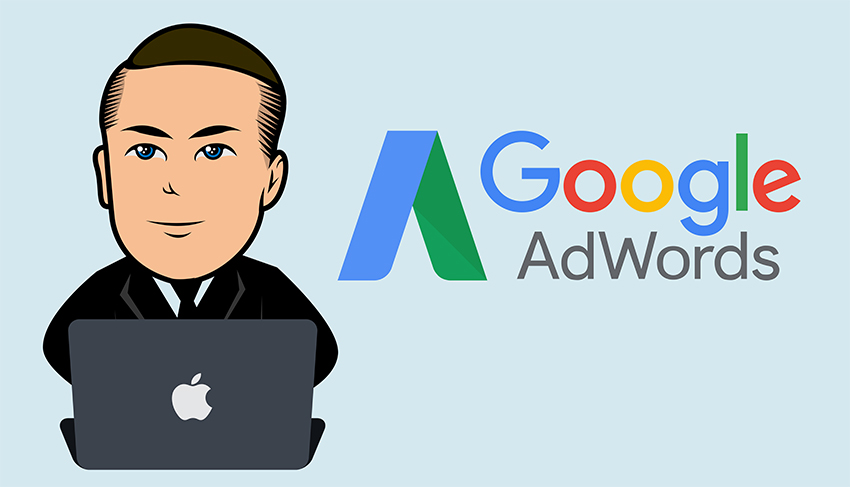Master Google Ads for realtors with our guide to generate leads, optimize ad spend, and run successful campaigns.
Lead Generation
Is Google Adwords for real estate agents? Should they be using it?
We get questions a lot from realtors who aren’t sure how to work the platform. Maybe they’ve put in some money to test campaigns, but they just can’t figure out how to generate hot leads that convert to listings.
Well, if this sounds like you, you’re not alone. And there’s a few common mistakes you’re likely making.
Why Most Realtors Using Google Adwords Fail
The fact of the matter is that most people fail at Adwords. It’s no different using Google Adwords for real estate. If you don’t understand how to use the platform and your specific goals, you’re setting yourself up to fail.
So what are these mistakes that are so commonly made?
- Weak Ad Copy
- Sending traffic to your home page instead of a landing page optimized for conversions
- Not collecting enough data to make an educated decision about your campaigns
- Lacking a solid goal (your KPI’s, which we’ll cover shortly)
There are many more factors to keep in mind when starting and running an Adwords campaign. I’ll be covering more common mistakes and how to create your first profitable campaign throughout this article. Starting with how to approach Adwords.
Why Adwords is Great For Realtors
Advertising on Adwords is not the same as on Facebook. On Facebook, you advertise primarily based on interests and demographic information. On Google, however, you can target based on intent.
What do I mean by intent?
Think about the buyer and seller keywords. What does someone search when they’re curious about what’s going on in the neighborhood? What do they search when they’re serious about buying or selling a house fast?
If you understand the platform correctly… You can target based on where a lead is in the buying or selling process. It’s this targeting that makes the platform so valuable. Think about it…
How much could you afford to pay for a pen-in-hand homeowner lead, ready to sign the contract and put the “for sale” sign on the front lawn? $1000? These leads do exist.
What if I told you that “sell my home fast” and “sell my house today” get over 600 searches on Google every month. Would you say that these leads are likely to close if you get them into your listing presentation?
Understanding Real Estate Keywords & Ad Copy
I want to explain real estate keywords and their accompanying ads so you can understand how to properly and profitably target. Let me first define the terms you need to know.
- Ad Copy: The written portion of your ad. This is the text you use to get people interested and clicking through to your site.
- Negative Keywords: The Google searches you don’t want your ads to show for. Usually, these are keywords that can be perceived as related to your positive keyword but are actually irrelevant.
- Broad Match: Setting your ad to show for your specific keyword as well as any search term variation that includes, or is perceived to be associated with your keyword.
- Phrase Match: Setting your ad to show when any search term including your exact phrase is searched for. For example, if your phrase is [real estate], you would show for the search [affordable real estate] or [real estate investment opportunities].
- Broad Match Modifier: Using the symbol (+), you can set your ads to only show when one or more words show in the search term. For example “+realtor +sell” and you would show for “I need a realtor to help me sell”
- Exact Match: Setting your ad to only show when an exact search term is entered into Google. For example [affordable condos in Miami].
When setting up your ad keywords, you can choose to target by one of the four options above. This choice depends on your specific goals (KPI’s – Key Performance Indicators). We will touch on KPI’s shortly.
Your ad copy will be determined by your keywords and whether you pick broad or exact match.
A broad match keyword will usually require a broad ad. For example, if your broad match keyword is [Real estate in Miami] you would simply have an ad about finding the best real estate in Miami.
An exact match keyword will require a specific ad. For example, if your exact match is the search term [Affordable condos in Miami] your ad should include those exact keywords and some information or prices that a lead looking for affordable housing would be attracted to.
Using exact match keywords is where you can take advantage of the “intent” a lead shows as I described above. Let’s now look at how you can target by location.
GEO Targeting For Real Estate Ads
Many realtors specialize in very specific neighborhoods. If this is true for you, you’ll want to take advantage of the geographical targeting that Google affords you.
You can break your targeting down to only show ads in specific zip codes.
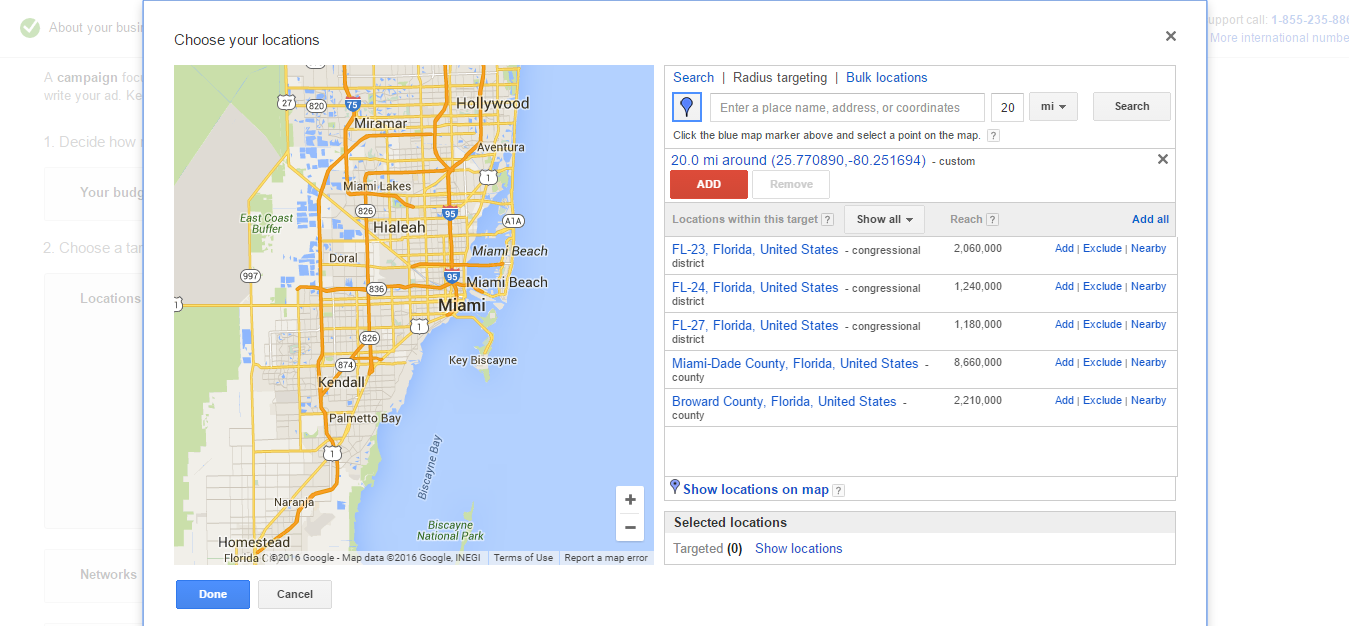
You can also target by the radius (distance around your target zip code) or “bulk target” locations. This is a handy feature if you want to advertise in just a few locations.
Excluding location is also an option, which is useful if you service everywhere in your city except for a few specific areas.
As I said above, another important factor to keep in mind when using Adwords for real estate is having the right goals in place.
Knowing Your Key Performance Indicators
What are your KPI’s? Are you looking to use the ads to generate brand recognition (like a billboard)? Do you want leads immediately or leads that you can bring into your sphere of influence and nurture?
It’s important to understand your goals so that you can appropriately dial in your ad campaigns. Before talking more about this, let’s look at a couple metrics.
- Impressions: The number of people who have seen your ad.
- (CPM) Cost Per Mille: The cost for 1000 impressions on your ad.
- (CTR) Click Through Rate: The percentage of impressions that click your ad. For example, if 100 people see your ad and 5 people click on your ad, you would have 5% CTR.
- (CPC) Cost Per Click: The cost for getting someone to click on your ad.
- (CPA) Cost Per Action: This is also known as the cost per conversion. It’s the total amount you spend on clicks vs. the number of times you get those visitors to take an action (schedule a call, download your lead magnet etc).
To build brand recognition on the cheap you want to use broad keywords and dial in your CPM.
To generate hot leads you want to determine the keywords with the most serious buyers/sellers and optimize your ads so that they have a high CTR. This high CTR will improve your ad score so that your ad will be the first seen (there’s more to this but that’s the idea on the surface)
To generate consistent leads affordably and bring more people into your sphere of influence you want to focus on your CPA. Optimize your conversion rate by working on your offer (like a lead magnet or personalized CMA) and landing page.
I also want to note that when you’re trying to get the pen-in-hand homeowners… you have to look at the big picture.
An ad can be doing great by the conversion numbers you get on Google… But how many leads are converting to actual listings or buyers?
Your listings and sales are the important numbers. As an advertiser, the bigger picture isn’t about just reducing your CPC. Your real job is to find your BEST LEADS and figure out how to maximize your ad spend so that you are the person who gets their business.
It doesn’t matter if there are only 100 people a month searching for your keyword and it costs $10 a click. If you get one person to list their home, you’ve won. ($1000 isn’t a big deal to get a customer that could net you 5-10 times that)
“Ultimately, the business that can spend the most to acquire a customer wins.” – Dan Kennedy
Other Strategies To Optimize Adwords For Real Estate
There are a few other ways you can optimize your ads. These can be very important, so keep them on your radar when trying to dial in your campaigns.
Time & Date
I’ve seen campaigns that work really well Monday through Thursday, then drop off the map on Friday. Some campaigns perform during the day and not at night. This can cause you to pay for traffic that doesn’t convert.
It’s weird, I know. But I’m serious. This is one thing you should at least keep your eye on once you’ve tested your ads for a bit.
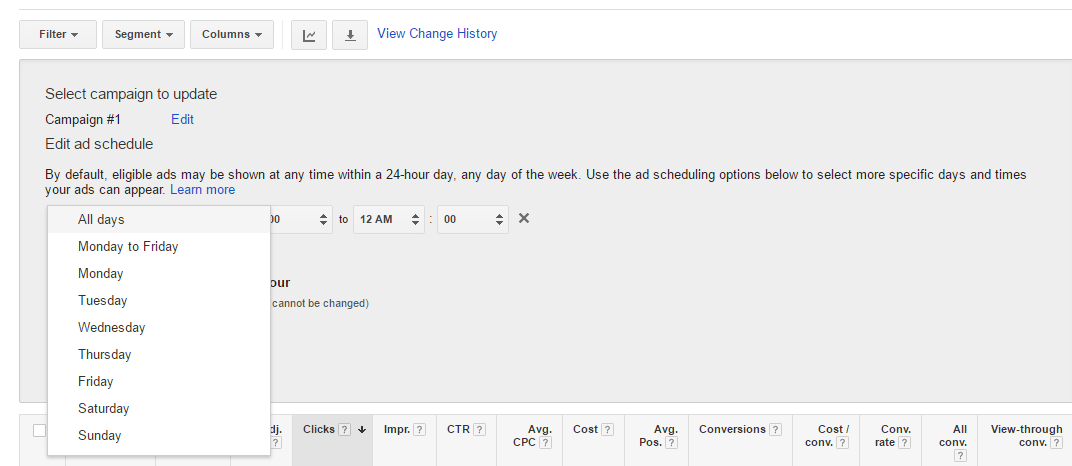
Device Type
One thing we’ve noticed at AgentFire is some of our ads convert really well on a desktop, but not on mobile. Actually, we don’t show our ads on mobile devices anymore.
Mobile ads are great for sub $100 consumer products as people make impulse purchases. Not so when it comes to buying a $1500 website (or buying/selling a home). At the end of the day though, it’s all about testing.
For example: If you’re optimizing an ad for mobile it may make sense to try making an ad that gets people to call you (rather than sending them to your site).
Negative Keywords
I mentioned negative keywords above but want to go more in-depth. A potential problem when using Adwords for real estate advertising is that your ad may show up when it shouldn’t.
Showing your ad to people who shouldn’t be seeing it can dramatically increase how much you spend. For example, because you have “house” as a positive keyword, you may show up when people search for…
- Dog house
- Doll house
- Boat house
And these are search terms you definitely don’t want to show up for. There are a wide range of keywords you may want to make negative. Especially if you are focusing on an ad that is very targeted, ex: people who want to FSBO.
To avoid costly campaign mistakes, it’s important that you go back through your ads to see what search terms you are showing for and refine your ads using negative keywords.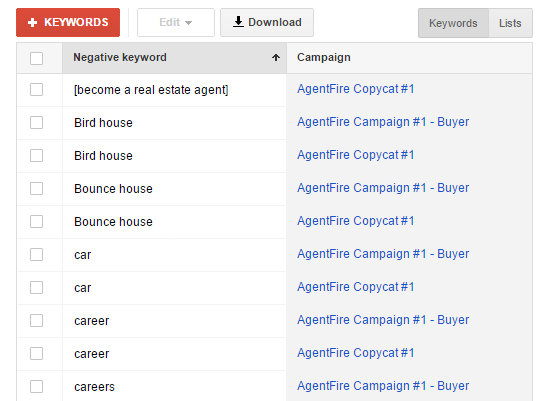
Planning Your First Real Estate Ad Campaign
By now you should have a basic understanding of Google Adwords campaigns. I also want to take you through the process of finding a profitable ad and optimizing for conversion rates.
So what does a good ad look like?
- Identifies need/desire with prospect
- Speaks their language
- Demonstrates value and authority
Eugene Schwartz said that you can’t create a desire within your market. You simply have to identify what your audience already needs/desires, and then create an ad that speaks in their language.
This may mean reiterating on commonly held opinions within your community.
For example, if the consensus is that a certain area is exploding, you could make an ad like… “It’s True. Homeowners in Four Oaks are getting massive returns on their property investments.”
Further, you’ll want to include a demonstration of authority where possible. Houses sold, years in the business etc. This helps build trust.
Finding Ads That Already Rock
The great thing about the internet is you don’t have to start from scratch. There are tools you can use to find ads that are already profitable, and then inject them right into your campaigns for testing.
These are called competition research tools. Use them to identify both great ads and the keywords used for their ads.
SpyFu
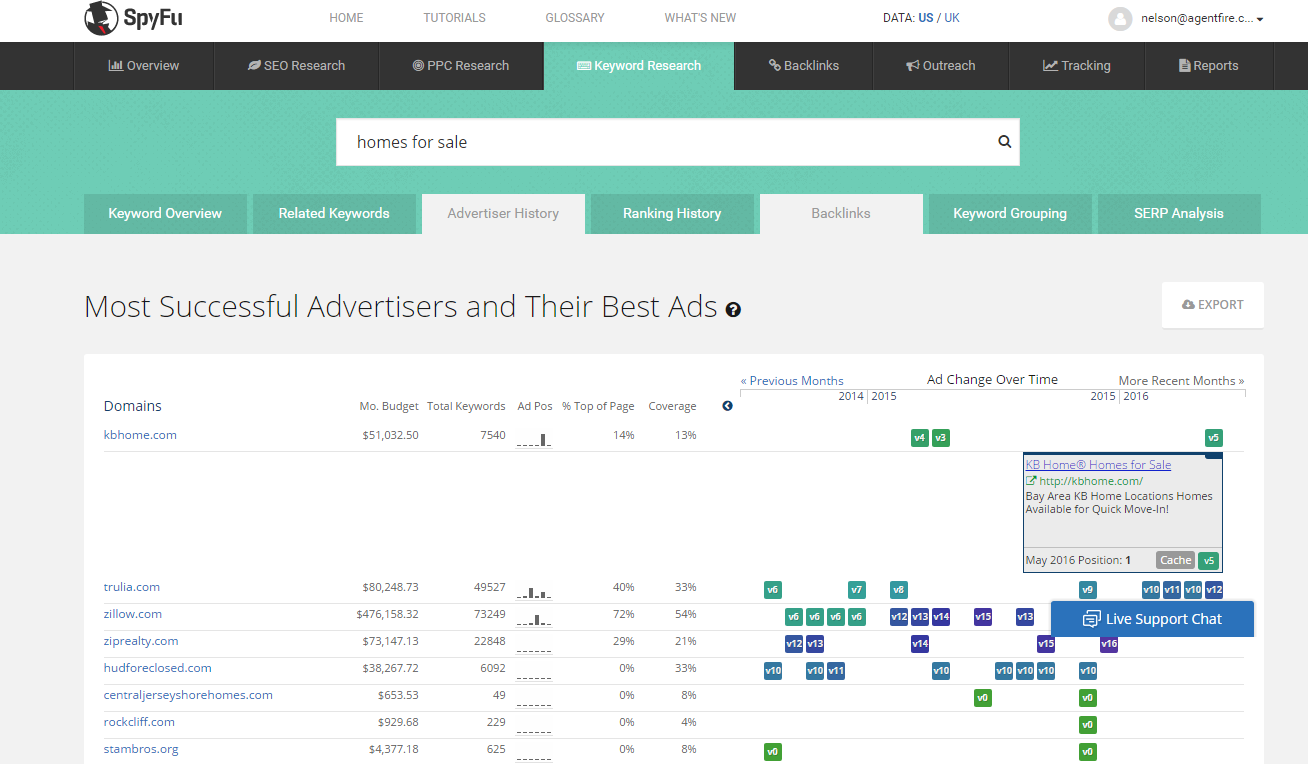
This is the tool we use at AgentFire. It allows us to search for specific keywords and see the historical data for advertisers – the ads they’ve tested, how long they’ve used them for etc.
You can usually tell if an ad is good by how long the advertiser ran it for. Your job is to simply take the best ads, test and optimize them for your own campaigns.
Using SpyFu you can also search for specific domains. Is there a realtor or team in your city that absolutely kills it? A tool like this pulls back the curtain so you can see exactly what they’re doing…
SEMRush
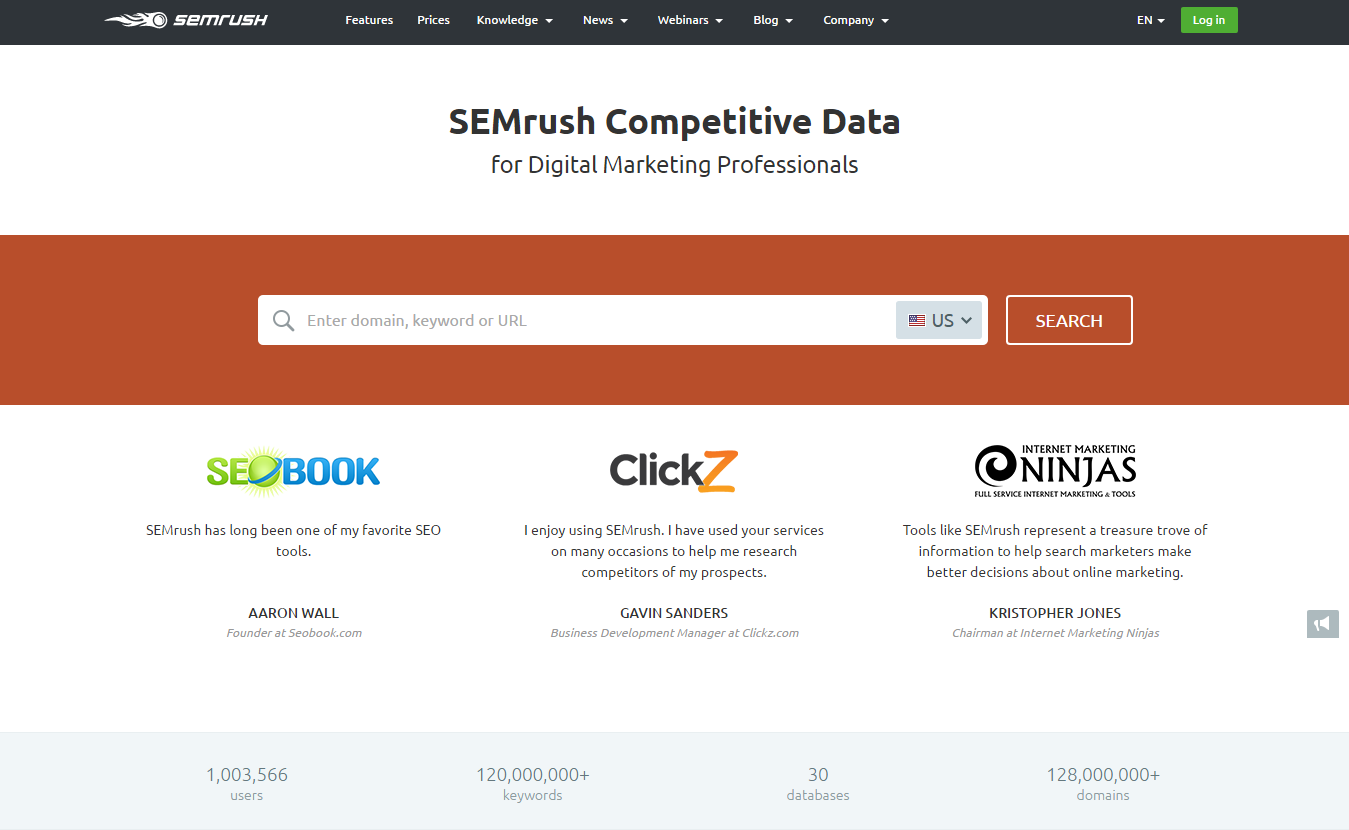
This is an alternative to SpyFu which also allows you to search for backlinks, do research for video advertising and more. A lot of trusted companies use SEMRush.
Google Search
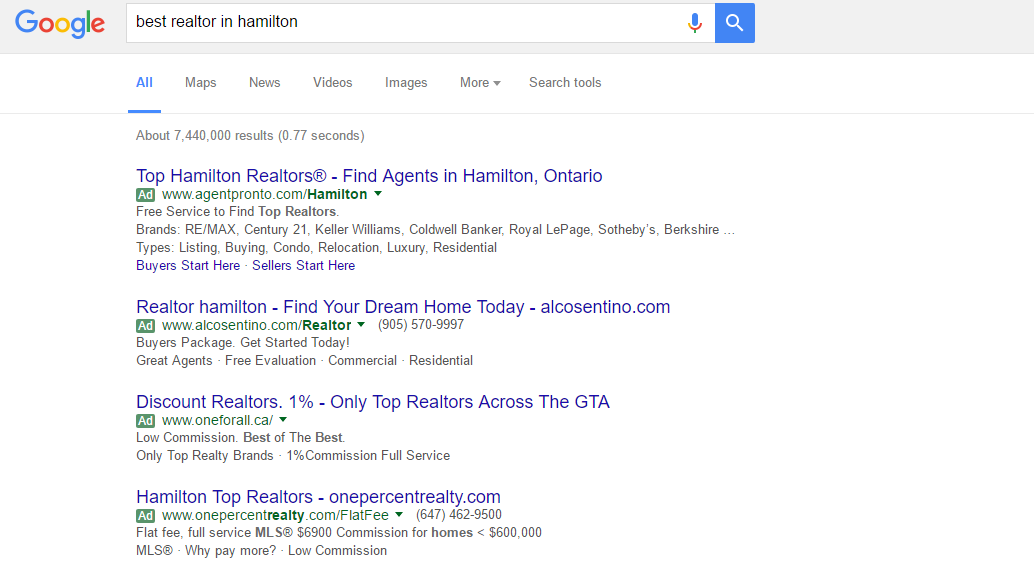
If you’re on a budget, you can always go to Google and try to find advertisers. You know they would have spent a while planning their ads and testing.
It’s not the best way to do research… but will still help save you time and wasted ad spend.
Google Keyword Planner
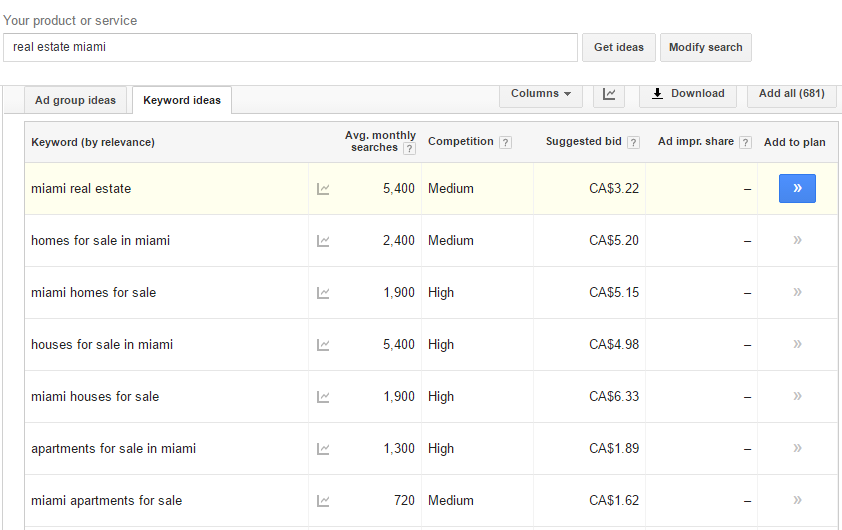
Using the Google Keyword Planner, you can search for real estate related keywords to use in your ads. It will give you an estimation of search volume as well as CPC.
Two other tools I want to mention quickly are Google Trends and TermExplorer. You can use them to find some examples of trends and long-tail searches that people make frequently.
This can help you make more specific and targeted ads than your competition.
Setting Up Your Ad Campaign
Now let’s get your first campaign up and running! Here’s what we need to do:
- Choose a keyword
- Create a few compelling ads
- Optimize your landing page
- Set up ad spend and conversion tracking
Choosing Your Keywords
How do you decide what keywords to pick? There’s no one-size-fits-all approach but in general… If you’re on a budget and your website isn’t great – pick the low-medium competition keywords.
If you have a little money to spend with a good website – you can go for the high competition keywords too.
Avg. CPC: $3-5
Your bid depends on your goals. If you want to get to the top of the page, you’ll obviously have to bid higher. If you’re just looking for conversions, bid enough to get clicks then optimize your ad.
To mitigate risk, use exact match and phrase match keywords. You’ll have more control over web traffic and more quality clicks. You want to avoid broad match keywords if you’re on a tight budget but if you have leeway for some testing, using broad match modified keywords (where each word is preceded by the “+” modifier) can be a great way to explore how your visitors are looking for you.
As for the number of keywords we test… That number is usually 10-20 per ad group. We continually test different ad copy to find the gems.
Creating Your Ad Copy
Having a compelling ad is super important. If you increase its effectiveness, you’ll increase your click-through rate. If you increase your CTR, you’ll increase your ad-score and take a higher ad placement.
This higher ad placement will help you get more clicks, and the cycle just keeps going.
As Google gives priority to advertisers who please their customers… It’s important to focus on increasing your CTR (and optimize your landing page for conversions, which shows you provide what your ads claim they will. We’ll touch on LP’s shortly.)
P.S – I’m giving you a list of 17 different real estate ads proven to convert in my swipe file. Keep reading or scroll down to download that for free.
Extra Ad Tips:
- Ad Extensions like site links and callouts make your ads more compelling
- Avoid using all-caps, exclamation points and superlatives like ‘better than’ or ‘#1’
Now let’s move on to where you’re actually sending your traffic… A landing page.
Setting Up Your Landing Page
LP’s are so important that I want to create a full guide to them in the future… I will give you a basic run-through for now though.
The goal of a landing page is to promise something of value and deliver that value without confusing your visitor. The first place to focus when constructing your landing page is on the offer.
What can you offer?
- Free automatic home valuation
- Buyer and seller guide
- Specific property search
- Valuable information/expertise
Once your offer is set in place, you have to deliver on the offer with the most consistent, authoritative message possible. This means…
- Reiterate your keyword and ad copy on the headline of your landing page
- Use consistent terminology, facts, and testimonials to build trust
- Provide your visitor with only one option (a single offer)
Not only does using your keyword on your landing pages improve ad score, it will likely improve the amount of time a visitor spends on your site (which is also good for ad score). This is because you ‘speak their language.’
Building trust increases your conversion rate, as does offering only one possible outcome. Ask them to take one action (sign up for this free report, enter for a free home valuation etc.)
Asking them to take multiple actions confuses visitors and drastically lowers your conversion rates.
If you’re interested in checking out some successful landing pages, I recommend Swiped. They are an awesome resource.
Ad Spend & Conversions
Our general rule of thumb at AgentFire is $30-50 per day, per campaign when in the testing period. And $50-70 to continue optimizing and driving conversions once our initial ads are proven.
Once we have at least 1000 clicks and 30 conversions, we begin tweaking our ads.
The most important part of this stage is testing and tracking. Too many people throw money at ads and aren’t even sure what their visitors are doing.

Tracking Your Conversions
Make sure you understand what percentage of people that click onto your ad are converting.
Some people look at their ads and say “Wow, look at my CTR! It’s through the roof!” Then they set up/look at their conversion tracking and they converted barely anyone.
At the same time, you could look at an ad with significantly fewer clicks, but much higher conversions. This is why it’s important to set up conversion tracking.
When you’re ready to do that, refer to this guide to conversion tracking on Wordstream.

1. Focus on the Broad Match Modifier
Everyone thinks that PPC campaigns are just about driving traffic. It’s a numbers game, right? Not true.
If you’re worried about the sheer amount of traffic you get, you’ll pay lots of money for unwanted clicks. So it’s better to have less, but more qualified clicks. You can accomplish this using the broad match modifier.
2. Monitor Your Results
Use the reports that Google gives you. One of the most important is the “Search Terms” report. This will give an overview of how your visitors find you and the tools to refine your keywords.
Refining your keywords can help you create more compelling ads. You can also determine the unprofitable search terms and add them to your negative keywords list.
3. Make Decisions With Data
Let your campaign run for a while and collect data. You can use this data to make informed optimizations later. Don’t rush to make changes before you get 1000 clicks and 30 conversions.
You need to make decisions based on numbers and data instead of merely opinions!
4. Test, Test, Test!
Test, refine your ads and repeat. Keep dialling in your ads because you never know how much optimization you still have left to squeeze out. Even when you think an ad is perfect, there may be room to improve CPA.
Also, remember that everything in digital marketing is about testing because something that converts today; might not convert tomorrow!
In Conclusion
Adwords can be a very powerful platform if you learn how to use it correctly. And armed with the information in this guide, you should have everything you need to start testing your first campaign (or optimizing your existing one).
There are a ton of things I still want to cover, so look out for a more advanced guide. Subscribe to our newsletter now so you don’t miss out.
Also, make sure you download the Swipe File below as I’m giving you access to a TON of ad copy tested and proven to convert, as well as keywords to use for your ads.
This is all hand-picked and will be extremely useful when you go to set up your campaign. Especially the negative keywords (which will save you huge $$$).
